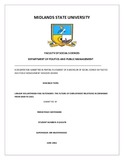Please use this identifier to cite or link to this item:
https://cris.library.msu.ac.zw//handle/11408/2414| Title: | Labour voluntarism and autonomy: The future of employment relations in Zimbabwe from 2000 to 2015. | Authors: | Matanhire, Persistance | Keywords: | Labour voluntarism | Issue Date: | Jun-2016 | Abstract: | Labour voluntarism and autonomy alludes to the free will and independence of workers in shaping work processes to influence desirable outcomes. The right to strike, the right to form voluntary trade unions and the right to voluntary collective bargaining underlie labour voluntarism and autonomy. Labour voluntarism and autonomy came as a response to capitalistic tendencies and racial prejudices in the colonial Zimbabwe. Nonetheless, the fight for voluntarism and autonomy involved all labour regardless of race. Capitalism and labour voluntarism are not indigenous ideologies but were adopted with the coming in of Western civilization and organized employment interactions. The ZCTU, as the pulse of the labour movement has developed in a stifled environment which is characterized by a nugatory Collective Bargaining which is made such by arbitration and the nature of NECs which are funded by capital, the discouragement of the right to strike by the Acts which govern employment interactions in the public and private sectors respectively and lack of autonomy of trade unions from political elements.The phenomenon was explored largely through a qualitative method and partly through quantitative approach. This was an effort to achieve close to accuracy in the findings. The researcher employed three data gathering techniques which comprised of in depth interviews, questionnaires and documents with persuasive value to the research. These were instrumental in the collection of both quantitative and qualitative data. Questionnaires were used to amass required and relevant data from employees and trade unions. Interviews were also employed to obtain comprehensive data from individuals who matter and who are experts in their zones of specialization. Interviews were administered to labour officers and administrators. Individual observation and documentary evaluation was also instrumental in amassing data.The struggle for voluntarism and autonomy is an on-going activity given that organized strike action is deteriorating and is being replaced by individual unorganized ways of expressing displeasure in processes and outcomes of work and collective bargaining is no longer revered by workers as a combined effort to control terms of work as found in the research. Moreover, the public sector workers are obliged to serve and voluntarism and autonomy is limited in that sector. Grey areas in legislation causes misperception, For example section 24 of the Labour Act does not rightly say whether a workers’ committee has legal capacity or not. Such provisions should be corrected. The government and capital should confer full effect to labour voluntarism and autonomy to enable the worker to command a fulfilling life | URI: | http://hdl.handle.net/11408/2414 |
| Appears in Collections: | Bachelor Of Science In Politics And Public Management Honours Degree |
Files in This Item:
| File | Description | Size | Format | |
|---|---|---|---|---|
| MATANHIRE,P.pdf | Full Text | 2.19 MB | Adobe PDF |  View/Open |
Items in MSUIR are protected by copyright, with all rights reserved, unless otherwise indicated.



